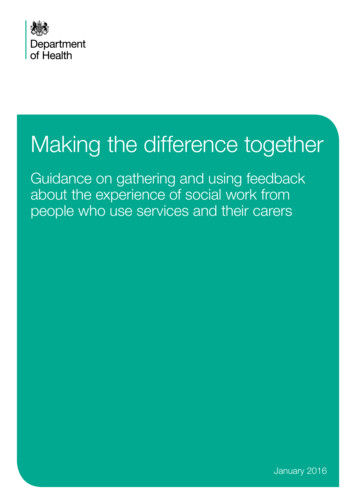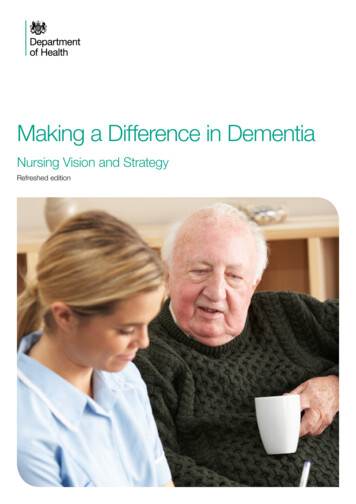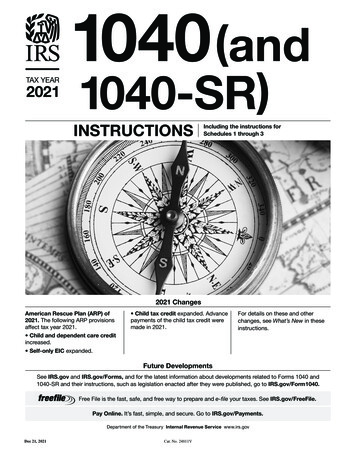
Transcription
Making the difference togetherGuidance on gathering and using feedbackabout the experience of social work frompeople who use services and their carersJanuary 2016
Making the difference togetherGuidance on gathering and using feedbackabout the experience of social work frompeople who use services and their carersDr Ruth AllenDr Sarah CarrDr Karen Lindewith Hari Sewell
With thanks for their contributions to:Dorothy Gould, Service user Consultant.Jack Nicholas, Robert Punton and Clenton Farquharson, Community Navigator ServicesUser-led Training and Development Organisation.You may re-use the text of this document (not including logos) free of charge in any formator medium, under the terms of the Open Government Licence. To view this licence, nt-licence/ Crown copyrightPublished to gov.uk, in PDF formatwww.gov.uk/dh
ContentsIntroduction1Chapter 1: Service user and carer feedback within theSocial Work for Better Mental Health initiative3Chapter 2: Developing this guidance5Chapter 3: Guidance One: Implementing a tailored‘Experience of social work’ feedbackquestionnaire9Chapter 4: Guidance Two: Gathering feedbackthrough collaborative conversations aboutpractice between social workers and peopleusing services or carers19References25Appendix One: Service user feedback questionnaire29Appendix Two: Carer feedback questionnaire39
Introduction 1IntroductionThis document provides guidance onpractical ways to gather and use directfeedback about people’s experiences ofsocial work practice within mental healthservices. It is aimed at social workers, theirsupervisors, managers and workforce leads.It is also aimed at people using services andtheir carers or families because they shouldbe involved in co-producing approaches tointegrating direct feedback into social workpractice and service improvement from theoutset.The importance of using direct feedback toevaluate the quality of practice at the levelof individual practitioners is increasinglyrecognised across the health and careprofessions in England. Services userfeedback is central to medical revalidationand the new nurse revalidation process.It is already a core requirement of socialwork qualifying training, it is included inthe Assessed and Supported Year inEmployment assessment process andembedded in Approved Mental HealthProfessional training.However, it is not a routine activity (neitherby custom not by regulatory requirement) formost qualified social workers in day to daypractice. While social workers recognise thevalue of understanding the lived experienceof people with mental health conditionsto promote empowerment and serviceuser ‘voice’ and choice, practitioners andsupervisors do not routinely or formally useservice users’ (and carers’) views about thepractice as part of reflective learning.Social work should be a ‘user-led’ (and carer/family-led) profession – this is at the core ofour professional ethics and perspective. TheSocial Work Reform Board service user andcarer consultation on social work reportedthat:‘the overriding message from theresponses was that service user and carerinput must be an essential part of anydevelopments and ongoing work. It wasstressed that it is important that this is seenas an integral part of social work trainingand development and not an add-on’(Social Work Reform Board, 2010 p1)Service user and carer feedback can informcritical reflection, individual supervision,appraisal and continuing professionaldevelopment. Individual and group feedbackcan be collated and analysed to measure andimprove individual, team and organisationalperformance against practice standards (e.g.the Professional Capabilities Framework).Direct feedback enables us to assess thequality of working relationships betweenservice users, carers and practitioners and itcan be used to improve people’s experiencesof processes and relationships as well asoutcomes – as service users and familiesoften say, it is not just what social workersdo but how they provide support and therelationship context that is so important forrecovery and empowerment.
1. Service user and carer feedback within the Social Work for Better Mental Health initiative 3Chapter 1: Service user and carer feedbackwithin the Social Work for Better MentalHealth initiative1.1. The Social Work for Better MentalHealth (SWfBMH) initiative proposes thatdirect service user and carer feedback onpractice should be explicitly embedded inlocal mental health social work workforce andpractice development frameworks. There area variety of reasons for this, most particularly: To find out directly what people findbeneficial/detrimental. To learn and make changes in practicefrom both positive and critical feedback. To enhance service users and carers’opportunities to influence practice andthe definition of quality support fromthe professionals who service them ascitizens. To identify locally what is found to bedistinctive or valuable about social workwithin multi-professional systems, thussupporting the definition of the socialwork role vis a vis other professionals. To support and maintain reflectivepractice throughout the career ofpractitioners. To support the content of effective andcreative supervision and appraisal for staffthrough providing a framework for themto present and discuss service user andcarer feedback. To provide managers and practice leaderswith useful service user, carer and familyexperience and service quality informationregarding individual practitioners and/orgroups of staff. To provide a platform for further serviceuser, carer and family involvement in staffdevelopment activities e.g. informingcurricula of workforce plans and trainingcourses which may include service usersor carers in delivery. To provide information about whetherconditions for good practice are beingset – e.g. gaining feedback from serviceusers and carers about the amount oftime staff have available to spend withthem or the frequency of contact, orwhether social workers appear rushedor inattentive which may relate to stress,caseload or workflow managementproblems.
2. Developing this guidance 5Chapter 2: Developing this guidance2.1. This guidance is based on researchinto what service users and carers value andfind effective in social work practice; researchliterature on service user quality of lifeindicators and recovery measures; practicefeedback tools from social work educationand patient satisfaction surveys from generaland mental health. It also incorporatesconsultation responses from senior mentalhealth social work leaders.2.2. The background research for thisguidance and the development of thefeedback questionnaires has been hasbeen undertaken by Dr Sarah Carr, mentalhealth service user consultant and AssociateProfessor of Mental Health Research atMiddlesex University, working with the otherSWfBMH authors1 on the final guidance.The document also draws on consultationmaterial gained specifically for this projectfrom other Experts by Experience.identified the following recommendations forapproaching service user feedback, whichmust be: ‘Tailored to the professional group [and]service user groups. Designed according to judgementsabout the capacity and willingnessof a particular service user group torespond to a particular form of [feedback]assessment: a standard formatquestionnaire, story-telling, supportedconversation, or a face-to-face evaluation,bearing in mind the costs and benefits ofeach Service users should be able to choosebetween methods of feedback accordingto their communication abilities andpreferences but in practice this may bedifficult to implement.’(Chisholm & Sheldon, 2011 p2-3)2.3. There are many possible approachesto gaining service user and carer feedback,and this guidance is not a definitive approachto cover all situations. Each service systemneeds to consider with service user and carerpartners what approaches most suit theircontext.2.5. Speaking of student social workers,the College of Social Work (TCSW) notedthat ‘there is no single way in whichstudents of social workers should seekfeedback from people they work with’ (nowclosed), suggesting that a choice of severalapproaches may be relevant including:2.4. There is, of course, an existingevidence-base on the principles and practiceof administering service user experienceand satisfaction feedback tools. The PickerInstitute evidence review and consultation Direct observations (of practice).1Dr Ruth Allen, Dr Karen Linde and Hari Sewell. Questionnaire, online survey or feedbackforms (including open-ended questions). Gathering feedback over time (verbal andnon-verbal, formal and informal). Supervision records.
6 Making the difference together – Guidance on gathering and using feedback about the experience of social work frompeople who use services and their carers Feedback from other people involved; Work products and records.‘topic guide’ for further exploration of serviceuser and carer views and experiences at theindividual level, where appropriate. Critical reflection and storytelling.2.9. A questionnaire can be tested for(adapted from TCSW, no date) validity and reliability over time to gaugeits usefulness and accuracy in providing2.6. This document proposes two specificapproaches to gaining service user and carer feedback across settings. Developed in thisway, a questionnaire is particularly usefulor family feedback:for formal research purposes and this is Implementing a tailored ‘Experience ofsomething that the Social Work for Bettersocial work’ feedback questionnaire forservice users and carers (see Appendices Mental Health (SWfBMH) initiative will betaking forward.1 and 2). Gathering feedback through collaborativeconversations between social workersand people using services or their carers.Guidance One: The experienceof social work feedbackquestionnaireGuidance Two: Gatheringfeedback through collaborativeconversations2.10. The second approach within thisguidance encourages practitioners andsupervisors to work with service usersand carers to develop a local methodology2.7. The first of these approaches wasto hold collaborative conversations tochosen because, while there is an evidenceexplore and capture the experience ofbase for the development and use of servicesocial work services from the service useruser feedback questionnaires in mental health or carer perspective. This is a simple thinggenerally, there is no pre-existing tailored tool to describe and quite a hard thing to do –for mental health social work. A questionnaire which is probably why it is not a commonis useful because it can be used by anform of gaining feedback in practice outsideindividual or it can be administered acrossof training courses for social workers. Ita workforce and the results aggregated andoffers great potential for learning at allanalysed for trends etc. Anonymity maylevels of the organisation, improvement inbe offered and this is often very importantpractice of individuals and groups of staff,to enable service users and carers to feelincreased transparency about professionalsafe enough to provide feedback. But aactivity and promotion of conversationsquestionnaire can also be used with a named about experiences of social work acrossindividual and/or it can be used to find outan organisation. It has the potential toabout a specific social worker or a group ofchange culture and practice. However, tostaff.be successful key obstacles need to beovercome.2.8. The questionnaire content providedhere is derived from research into what we2.11. The difficulties in this approach relateknow is often important to service usersboth to staff and to service users/carers.and carers in their encounters with socialThe former may be concerned that this willworkers (and other mental health staff) andexpose them to undue criticism and maythus the questionnaire itself may be a usefulnot trust how their organisation will use such
2. Developing this guidance 7feedback unless supervisors and managersmake the framework for the process verytransparent. Social workers may also needtraining in how to make the most of suchconversations, how to reflect on the feedbackin a helpful way and integrate it into theirpractice. This may be particularly true forsocial workers who have not undertakenformal training involving reflective practice fora long time.2.12. Supervisors and managers mayalso need training in how to support staffwithin this process and how to evaluatethe emerging feedback constructively. If anobservational element is introduced – i.e.the supervisor or other colleague observesthe feedback discussion, which is one of theoptions discussed in the local frameworkguidance below – then the observer mayneed induction or training in that role also.2.13. Timing and choice of which serviceusers and carer to speak with are alsoimportant; not all social work encounters maybe suitable for such reflective conversationsand choosing the right moment to approacha service user or carer is essential for theconversation to be useful to both parties.2.14. Service users and carers may (at leastinitially) also find a collaborative conversationapproach unwelcome and/or exposing – andcrucially may fear the experience will re-playpower differentials with professionals ratherthan providing a safe and equitable spacefor a truly collaborative exploration. Serviceusers and carers may also fear criticism willnegatively impact on their care and supportin the future and considerable assurance isrequired in order for this fear to be allayed.2.15. Service users and carers need to havefull access to information to be able to feel incontrol of their part of the process and to beable to speak freely. Choice and control overwhen, where and how such a conversationhappens will be very important. Access topeer support from people who also have hadsimilar experiences of social work and mentalhealth services may also be crucial. Andservice users and carers should have clearinformation about what the process is forand to what end the information gatheredmay be put.2.16. Like the questionnaire, the use ofcollaborative conversations in routinedevelopment of social work practice in mentalhealth has rich potential for further researchand the guidance here should be seen as astep along the path to our understanding howwe can co-create future professional practicethrough better dialogue with service usersand carers.
3. Guidance One: Implementing a tailored ‘Experience of social work’ feedback questionnaire 9Chapter 3: Guidance One: Implementing atailored ‘Experience of social work’ feedbackquestionnaire3.1. For this guidance, a tailoredquestionnaire for social work in mental healthhas been developed that draws upon existingresearch into service user feedback in mentalhealth. It has been suggested that tools toprovide service user and carer feedback onprofessional practice should build on existingvalidated instruments (Chisholm & Sheldon2011). However, existing measures may havelimitations if they have not been co-designedwith service users and carers, and thereforemay not capture what matters to them. Thereis also a lack of existing tools about socialwork practice. Such instruments exist forpatient feedback and patient satisfaction inthe medical profession, particularly for GPsand mental health practitioners includingpsychiatrists, but outside of educationalcontexts there are very few social workfeedback tools.3.2. Well-validated instruments are alreadyavailable and in standard use for themeasurement of general service user andcarer outcomes, such as the Adult SocialCare Outcomes Framework (DH, 2014). Arange of specific mental health outcomesmeasures, including those with user-definedoutcomes (Rogers et al, 1997; Crawfordet al, 2011), are also widely available foradaptation and use in mental health socialwork (Kiresuk & Sherman, 1968; Connell etal, 2012; Connell et al, 2014). The aim of theapproaches presented here is to define andprovide guidance on the implementation of aquestionnaire that contains measures tailoredto the mental health social work context.3.3. ‘Patient satisfaction’ questionnaires areincreasingly used in the health professions(including mental health) for 360-degreeperformance appraisal, training andprofessional development (Academy ofMedical Royal Colleges, 2009). Althoughused for social work education and practiceplacement assessment, at present no serviceuser and carer feedback mechanism (suchas questionnaires) is systematically usedin social work practice, including mentalhealth. A Picker Institute evidence reviewand consultation on service user feedbacktools in healthcare professions concludedthat implementing effective use of serviceuser feedback is complicated and did notautomatically improve practice. It alwaysneeds to be understood in context andshould be used as one of the relevant suiteof measures of quality and performance forprofessionals. The review concluded:‘Service users are uniquely placed toassess many aspects of the practitionerservice user interaction which have beendemonstrated to be associated withsatisfaction, engagement and clinicaloutcomes Service user feedback[is] a useful measure of a practitioners’performance but not in isolation of otherfeedback (e.g. 360 degree feedback) andperformance measures.’(Chisholm & Sheldon, 2011 p1)
10 Making the difference together – Guidance on gathering and using feedback about the experience of social work frompeople who use services and their carersWhat should be covered in aquestionnaire about social work inmental health?3.6. Service users and carers have longdefined what is important for a positiveexperience of social worker and social workpractice:3.4. Being involved as much as possiblein social work decision-making andunderstanding how decisions have beenmade is very important for the engagementand empowerment of service users inmental health (Munford & Sanders, 2015).Even where social workers are legallyrequired to use powers of control (such asdetaining people under the Mental HealthAct 1983 using the powers of an ApprovedMental Health Professional, there are oftenopportunities to seek involvement and find outa person’s wishes, even within an ultimatelycontaining and controlling decision framework.Even retaining small amounts of control.‘They value courtesy and respect, beingtreated as equals, as individuals, and aspeople who make their own decisions; theyvalue workers who are experienced, wellinformed and reliable, able to explain thingsclearly and without condescension, andwho “really listen”; and they value workerswho are able to act effectively and makepractical things happen The way workersbehave, and what they do or not do,makes a big difference to the way peoplefeel about themselves and the quality oftheir lives ’(Harding & Beresford, 1996 p1)3.5. However, in a document on serviceuser carer feedback for social work practice,The College of Social Work noted thatit can often be ‘helpful to focus on the(social work) process and the service userand carer experience of it rather than thedecision, which they may not be able tochange’ (TCSW, no date). Service user andcarer research literature is clear that, fromthe service user and carer perspective, theexperience of the process – that is the qualityof the communication, responsiveness andrelationship with the social worker – is asimportant as the outcome of the serviceor support.3.7. Specific user-controlled research intomental health ‘case management’, highlightedsimilar findings on the effectiveness of thefollowing for social work practice:‘(the) process of getting a service and theway in which it is delivered can have amajor impact on users’ experience of aservice . users did not perceive processas detached from outcome.’(Shaping Our Lives National UserNetwork et al, 2003 p2) cultural sensitivity.(Beeforth, Conlan & Graley, 1994) ongoing, continuous relationships; trust and communication; strengths-based working andself-determination; empowerment and choice; practical help; social integration and communityactivities; family relationships; and3.8. In the specific case of risk managementand safeguarding, mental health serviceusers have reported the following about theimportance of involvement in assessment andmanagement: Support to reduce the chances of crisis.
3. Guidance One: Implementing a tailored ‘Experience of social work’ feedback questionnaire 11 A ‘full and frank’ discussion of risk withthe practitioner, with opportunities for‘increased trust between user andprofessional’ and ‘collaborative riskmanagement’.competence in developing therapeuticrelationships’ (Chisholm & Sheldon, 2011 p2).3.12. Finally, the tool can be informed byan existing validated evaluation instrumentthat measures staff support for personalrecovery in mental health (Williams et al,2014). The INSPIRE instrument includes Likertscale measurement of these aspects of therelationship between clinical practitioner andservice user: Service user involvement in riskassessment and management andpractitioners looking ‘holistically atall aspects of a person’s life may gosome way to enable more effective riskmanagement.’ (adapted from Langan & Lindow, 2004) 3.9. For social workers who are in the Approved Mental Health Practitioner role,particular sensitivity to the balance of power in the relationship with the service user isimportant: ‘The 1983 Mental Health Act allows peopleto be detained in hospital and treatedagainst their will on the groundsof safety or for the protection of others. It isnot really possible to change the balanceof power in services – really enable peopleto take control over their own lives andfoster genuine co-production and shareddecision-making – if at the bottom line, theprofessional can force the patient to dowhat they think best.’(Perkins, 2012 p19).3.10. The Carers Trust Triangle of Careapproach for the inclusion of both carersand service user in mental health careand support similarly emphasises theneed to draw on carer knowledge aboutrisk management and crisis prevention(Worthington et al, 2013).3.11. An evidence review of existing validatedinstruments for service user feedback in thehealth professions found that they broadlycovered aspects of professional practicesuch as ‘communication, respect for privacy,role in providing training, body language,‘I feel listened to by my worker.I feel supported by my worker.I feel that my worker takes my hopes anddreams seriously.My worker respects me.My worker treats me as an individual –more than a ‘diagnosis’ or a ‘label’. My worker supports me to make my owndecisions. My worker keeps hopeful for me evenwhen I feel at my lowest’.(KCL, 2013)3.13. Mental health service user and survivorresearch has shown that practitioners shouldbe open and responsive to individual mentalhealth service user concepts of recoveryand resilience, particularly taking account ofdiversity and equalities issues such as mightarise for people from black and minorityethnic, ‘new migrant’ and other marginalisedcommunities such as LGB and T people(Gould, 2012; Kalathil, 2011a; Kalathil2011b). This relates to the discharge of legalduties under the Equality Act 2010 and theexperience of service users and carers withregard to public authorities meeting equalitiesduties in tangible, beneficial ways.
12 Making the difference together – Guidance on gathering and using feedback about the experience of social work frompeople who use services and their carersCurrent national regulatorystandards and professionalguidance for social work5.1. Underpinning the roles of social workersare interrelated national performance andcapability frameworks.3.14. Any feedback process on theexperience of social work should reflectregulatory requirements and good practiceguidance. A questionnaire (and any otherprocess) should include questions designedto elicit information about these variousaspects of social work practice in mentalhealth. This includes the extent to whichdefined roles are evident in social workers’practice, how they shape the experienceof service users and whether they are feltto be valuable. The main current guidanceacross the sector for social workers in adultmental health services is the ‘Role of thesocial worker in adult mental health services’document (Allen, 2014) produced by theCollege of Social Work (now hosted bythe British Association of Social Workers).This defines five overarching roles forsocial workers which provide a distinctiveframework for practice within multiprofessional workforces. In synopsis, theseroles are:3.15. The profession is regulated through theHealth and Care Professions Council which,since 2009, has held the following proficiencystandards for social work:1. Enabling citizens to access services towhich they are entitled, discharging legalduties (particularly of the local authority)and promoting personalised working. understanding of key concepts of relevantknowledge base;2. Promoting recovery and social inclusionfor individuals, carers, families andfriends. ability to maintain records appropriately;Regulation maintenance of fitness to practice; ability to practice safely and effectively; ability to practice within legal and ethicalboundaries; awareness of impact of culture, equalityand diversity on practice; ability to practice in a non-discriminatorymanner; assurance of quality of practice; ability to practice as an autonomousprofession, exercising professionaljudgement; ability to reflect on and review practice; ability to communicate effectively; ability to work appropriately with others; ability to draw upon appropriateknowledge and skills to inform practice; maintenance of confidentiality; and3. Intervening and showing professionalleadership in complex situations. establishment and maintenance of a safepractice environment.(adapted from HCPC, 2012)4. Working co-productively with localcommunities and individuals to supportcapacity, resilience and active citizenship.The Professional Capabilities Framework3.16. Since 2012, in qualifying trainingand continuing professional development,5. Leading the Approved Mental Healthsocial work practice in England has beenProfessional service.widely assessed against the Professional(adapted from Allen, 2014)Capabilities Framework (PCF). This is a
3. Guidance One: Implementing a tailored ‘Experience of social work’ feedback questionnaire 13framework ‘owned’ and developed by theprofession, for the profession. It currentlyuses the following nine domains:1. ‘Professionalism – identify and behave asa professional social worker, committedto professional development.2. Values and ethics – apply social workethical principles and values to guideprofessional practice.3. Diversity – Recognise diversity and applyanti-discriminatory and anti-oppressiveprinciples in practice.4. Rights, justice and economic wellbeing– advance human rights and promotesocial justice and economic wellbeing.5. Knowledge – apply knowledge of socialsciences, law and social work practicetheory.6. Critical reflection and analysis – applycritical reflection and analysis to informand provide a rationale for professionaldecision-making.7. Intervention and skills – use judgementand authority to intervene with individuals,families and communities to promoteindependence, provide support andprevent harm, neglect and abuse.8. Contexts and organisations – engagewith, inform and adapt to changingcontexts that shape practice. Operateeffectively within own organisationalframeworks and contribute tothe development of services andorganisations. Operate effectively withinmulti-agency and inter-professionalsettings.9. Professional leadership – takeresponsibility for the professional learningand development of others throughsupervision, mentoring, assessing,research, teaching, leadership andmanagement.’ (TCSW, 2012)The Knowledge and Skills Statements3.17. The two Chief Social Workers forEngland have each produced separatechildren and families (2014) and adults (2015)Knowledge and Skills Statements (KSSs)that guide the standards to be reached bythe end of their Assessed and SupportedYear in Employment (ASYE). As noted aboveASYE programmes include direct serviceuser feedback within assessment processesbut this reflective approach does not routinelycontinue once ASYE has been passed.3.18. The KSSs are being further developedin both children and adults social work(through the Department for Education andDepartment of Health for England) to includeexpected capabilities beyond ASYE andincluding supervisory and practice leadershiplevels.3.19. The key knowledge and skills areas forthe KSS for adults are: Person centred practice. Safeguarding. Mental Capacity. Effective assessments and outcomebased support planning. Direct work with individuals and families. Supervision, critical reflection andanalysis. Organisational context. Professional ethics and leadership.3.20. The KSS for social workers in adultservices includes the following statementabout the direct practice of social workers.
14 Making the difference together – Guidance on gathering and using feedback about the experience of social work frompeople who use services and their carersSocial workers need to be able to workdirectly with individuals and their familiesthrough the professional use of self,using interpersonal skills and emotionalintelligence to create relationships basedon openness, transparency and empathy.They should know how to build purposeful,effective relationships underpinnedby reciprocity. They should be able tocommunicate clearly, sensitively andeffectively(KSS for adults para. 7 – DH 2014)3.21. In order to assess that this skill (andmany of the others described in the KSS)is developing and deepening beyond theASYE year, ongoing direct service user andcarer feedback must be necessary. This isan
Social Work for Better Mental Health. initiative. 1.1. The . Social Work for Better Mental Health (SWfBMH) initiative proposes that direct service user and carer feedback on practice should be explicitly embedded in local mental health social work workforce and practice development fram










